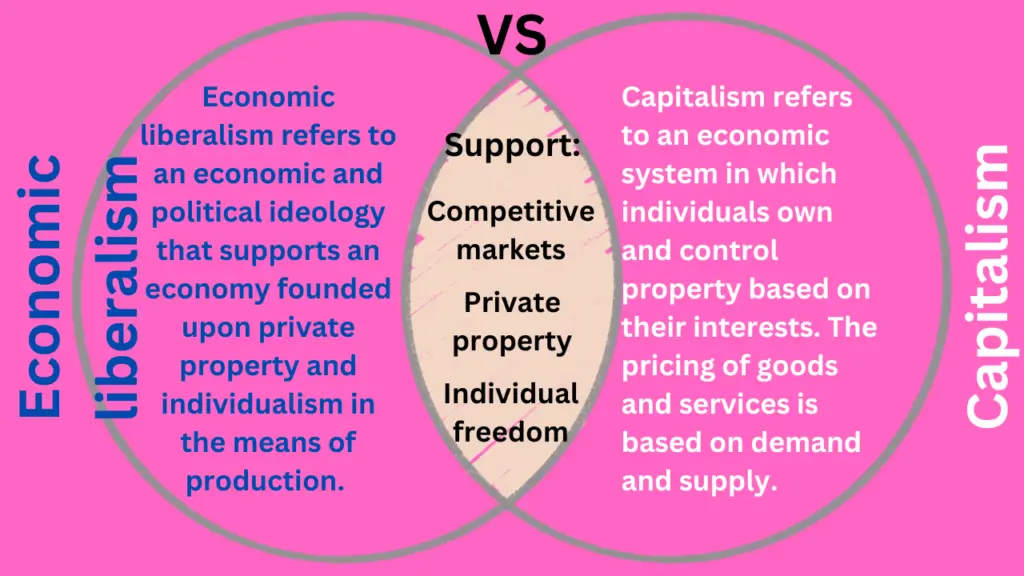Economic liberalism and capitalism are two terms associated with the type of economic system that is obtainable in a country. Our focus here is to determine the similarities and differences between economic liberalism vs capitalism. Before we proceed with the comparison, let us find out the meaning of each term.
See also: Coordinated Market Economy vs Liberal Market Economy
Economic liberalism and capitalism meaning
Economic liberalism and capitalism are each associated with a market economy. But just what do they mean? Let us find out.
What is economic liberalism?
Economic liberalism refers to an economic and political ideology that supports an economy founded upon private property and individualism in the means of production. This means that individuals are at liberty to do business with each other without government interference. The government also refrains from partaking in commercial and industrial activities.
Economic liberalism advocates for a free market with limited government interference, private property which enhances the transfer of land, and personal liberty which eliminates restrictions on the choice of occupations and consumption. This system is predicated upon the basic human nature of self-interest. Therefore, countries that implement economic liberalism are generally more productive due to the profit-motive of production. As a result of the increased productivity, there is a high level of rapid innovation, the facilitation of multiple exchanges, and the growth of the economy. Corporations also experience a good level of income generation especially when their products and services meet consumer demand.
Economic liberalism is both a philosophy and a means of coordinating capitalism. It includes programs and strategies geared toward promoting a liberal economy. Adam Smith is considered the father of economic liberalism. He first analyzed this concept in his 1776 work, an inquiry into the nature and causes of the wealth of nations. Although his analysis did not clearly oppose the government’s provision of public goods, it advocated for minimal government interference in the market. In his view, such a market would lead to more harmony, equality, and economic prosperity. Thus, it was a major concept that advocated the abolishment of feudalism and mercantilism and encouraged the move of the economy to capitalism.
In reality, however, economic liberalism did not result in the harmony and equality that Adam Smith foresaw even though it did lead to economic prosperity. The main reason why harmony and equality were not obtained was due to the presence of competition in the markets which lead to strained relations between firms and the radical individualism that the concept advocated.
What is capitalism?
Capitalism refers to an economic system in which individuals own and control property based on their interests. Market forces of demand and supply are the determinants of the prices of goods and services. Capital assets such as land, factories, and mines can be privately owned and controlled; capital gains generally accrue to these owners. Labor is purchased through the payment of wages and prices generally allocate labor and capital for alternative uses.
Under capitalism, the means of production such as land, factories, and machines are owned and controlled by capitalists who hire employees to utilize these means of production to create goods and services in return for wages. These workers, however, have no claim on the means of production nor the profits accruing from them as these belong to the capitalists. Instead of having a central planning committee that decides how the economy goes as is obtainable in a socialist or command economy, under capitalism, economic planning is left to occur spontaneously through voluntary, competitive, and decentralized decisions.
Two essential features of capitalism are production based on exchange value and private property rights. Most modern concepts of private property originate from John Locke’s theory of homesteading. In this theory, individuals claim ownership by mixing their labor with unclaimed resources. Once owned, the property can be legally transferred only through inheritance, gifts, re-homesteading of abandoned property, or voluntary exchange. Adam Smith captured the essence of the exchange value of production in the following statement: “It is not from the benevolence of the butcher, the brewer, or the baker that we expect our dinner, but from their regard to their own interest.”
Through this combination of the profit motive and private property rights, production efficiency is promoted as it motivates individuals to maximize the value of their property due to the profit it can generate. Both parties engaged in economic transactions will also have to consider each other’s needs as that is the only way of fulfilling their own personal need. Additionally, the individual who owns a property is entitled to any value associated with the property, hence, the more valuable a property is, the more trading power it confers on its owner. Furthermore, rational self-interest that ensues from demand and supply fosters economic prosperity.
See also: Free market vs regulated market: similarities and differences
Core principles of economic liberalism vs capitalism
- Competition
- Pre-established order
- Self-interest
- Individual freedom
Competition
A core principle of economic liberalism is competition. This competition refers to how different producers in the market relate to each other. Since every company aims to get the business of the consumers, it encourages creativity in terms of product packaging as well as marketing. Thus, each company’s goods and services compete with other businesses that operate within the same sector and provide similar products. Therefore, healthy competition is a steering mechanism of the economy that ensures the public’s welfare by making products available at competitive prices and quality.
In capitalistic economies, competition among firms is greatly encouraged and is also a core principle as it encourages entrepreneurship and innovation. The freedom present in the market allows individuals and corporate organizations to enter and exit the market at will. Consequently, more businesses emerge and consumers get to choose from a variety of available products and services. This further improves the social welfare of both consumers and businesses.
Pre-established order
One core principle of economic liberalism is the belief that every economy has a pre-established order and that the government should not interfere. The pre-established order is one in which every economic transaction functions accordingly if members of the community where the economy function allow the natural economic forces to flourish unchecked. The government is also expected to avoid causing chaos in the natural order by not interfering in the economy through economic planning.
This is in line with one of the core principles of capitalism whereby the government’s role in the economy is limited to the protection of property rights, ensuring contracts are kept and the provision of basic social amenities.
Self-interest
The ideals of economic liberalism propose that individuals acting in their self-interest end up promoting society’s interest. This is because, in the bid to fulfill a personal interest, each individual has to meet another individual’s needs. For instance, it is self-interest that makes companies get involved in the production of goods and services in order to make a profit. Consumers who need these products have to pay for them. Hence, the company’s self-interest towards making a profit and that of the consumer of getting a product or service are mutually met.
A similar thing happens in capitalism too because companies generally produce goods and services based on the profits they intend to make from the sale of these products and services. Hence, self-interest tends to bond producers and consumers in a capitalist economy and ensure mutual fulfillment of the need of each party. Self-interest connotes that people act in pursuit of their own good regardless of sociopolitical pressure. It is however interesting to note that these uncoordinated individuals end up benefiting society as a whole through the mutual self-interest fulfillment that ensues.
Individual freedom
Individual freedom is a core principle of both economic liberalism and capitalism. It is this freedom that fosters the owning of property, the establishment of several ventures, pursuing careers, getting an education, investments, etc. Due to individual freedom, companies can freely decide on the products and services they will offer; dissatisfied customers can stop patronizing companies that do not meet their expectations; investors can pursue getting good returns on their investments by investing in more lucrative ventures; workers can take up new jobs for better pay, etc.
The limited role of government in the economy furthers individual freedom. The role of government as supported by both economic liberalism and capitalism is the creation and upkeep of public institutions, national security as well as the establishment of the rule of law.
Does liberalism support capitalism?
Yes, economic liberalism supports capitalism as can be seen in its core principles of a competitive market, pre-established order, self-interest, and individual freedom which all support the existence of a capitalist economy.
See also: Mercantilism vs capitalism differences and similarities
Similarities and differences between economic liberalism and capitalism
So far, we have discussed the meaning and core principles of economic liberalism vs capitalism. Before discussing the similarities and differences that exist between them, let us have a look at a Venn diagram that briefly captures these differences and similarities between capitalism and economic liberalism.
Venn diagram of economic liberalism vs capitalism

Economic liberalism vs capitalism similarities
- Economic liberalism and capitalism support a competitive market. This brings about innovation and entrepreneurship.
- Both belief in a free market with minimal government interference.
- They both support individual freedom and self-interest as they aid in boosting economic activities and prosperity.
- Capitalism and economic liberalism support private property rights and the private ownership of the means of production.
- Both support an economy that is devoid of central planning, believing that an economy that functions based on the natural order is more beneficial to society.
Differences between capitalism and economic liberalism
- Capitalism is an economic system based on the exchange value of production and private ownership of the means of production. Economic liberalism is an economic and political ideology that supports individualism through self-interest.
- Capitalism in its modern form was first attributed to Louis Blanc in 1850 and then to Pierre-Joseph Proudhon in 1861. Economic liberalism is attributed to Adam Smith. He first analyzed this concept in his 1776 work, an inquiry into the nature and causes of the wealth of nations.
Now that we have seen these differences, let us summarize them in the table below:
Tabular differences between capitalism and economic liberalism
| Criteria | Capitalism | Economic liberalism |
|---|---|---|
| Definition | An economic system in which individuals own and control property based on their interests. Market forces of demand and supply are the determinants of the prices of goods and services. | A political and economic ideology that supports an economy founded upon private property and individualism in the means of production. |
| Proponents | Louis Blanc and Pierre-Joseph Proudhon | Adam Smith |
| Refers to | An economic system | A political and economic ideology |
See also: What is an Unregulated Market?
Is liberalism, capitalism?
By virtue of the meaning of each term, liberalism is not capitalism. Liberalism is a political and moral idealogy whereas capitalism is an economic system. However, because liberalism supports the significant characteristics of a capitalist economy such as private ownership of property and individual freedom, liberalism is often associated with capitalism.
Economic liberalism asserts that self-interest is a major driving force of the economy which harmonizes and satisfies the needs of both producers and consumers. This supports the central tenets of capitalism where competition is encouraged between producers to meet consumers’ diverse demands.
Last Updated on November 3, 2023 by Nansel Nanzip BongdapBlessing's experience lies in business, finance, literature, and marketing. She enjoys writing or editing in these fields, reflecting her experiences and expertise in all the content that she writes.
